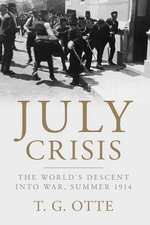The Negotiated Reformation: Imperial Cities and the Politics of Urban Reform, 1525–1550
Autor Christopher W. Closeen Limba Engleză Paperback – 7 feb 2018
| Toate formatele și edițiile | Preț | Express |
|---|---|---|
| Paperback (1) | 287.28 lei 6-8 săpt. | |
| Cambridge University Press – 7 feb 2018 | 287.28 lei 6-8 săpt. | |
| Hardback (1) | 695.06 lei 6-8 săpt. | |
| Cambridge University Press – 29 sep 2009 | 695.06 lei 6-8 săpt. |
Preț: 287.28 lei
Nou
Puncte Express: 431
Preț estimativ în valută:
54.97€ • 58.78$ • 45.83£
54.97€ • 58.78$ • 45.83£
Carte tipărită la comandă
Livrare economică 18 aprilie-02 mai
Preluare comenzi: 021 569.72.76
Specificații
ISBN-13: 9781108447454
ISBN-10: 1108447457
Pagini: 296
Ilustrații: 2 maps
Dimensiuni: 153 x 230 x 20 mm
Greutate: 0.44 kg
Editura: Cambridge University Press
Colecția Cambridge University Press
Locul publicării:New York, United States
ISBN-10: 1108447457
Pagini: 296
Ilustrații: 2 maps
Dimensiuni: 153 x 230 x 20 mm
Greutate: 0.44 kg
Editura: Cambridge University Press
Colecția Cambridge University Press
Locul publicării:New York, United States
Cuprins
Introduction; 1. Consultation and the urban hierarchy; 2. Imperial cities and collective politics; 3. Preachers, consultation, and the spread of urban reform in southern Germany; 4. The urban reformation in Donauworth; 5. The urban reformation in Kaufbeuren; 6. Negotiation and the rural reformation in eastern Swabia; 7. Eastern Swabia and the Schmalkaldic War; Conclusion.
Recenzii
'In this fresh examination of the German Reformation Christopher W. Close charts a new approach to one of its central puzzles: how and why the cities became the backbone of early Protestantism. Viewing towns as parts of wider urban networks, Close suggests that the success, survival, and resilience of the early reform movement hinged on a carefully tended process of mutual support, communication, collaboration, and coercion that he calls the 'negotiated Reformation.' This intriguing new model of urban religious reform promises to re-animate the debate about the triumph of the Reformation in the German cities and might even lend itself to broader applications for other parts of Europe where Protestantism and urban political cultures evolved hand in hand. The impressive research is paired with searching insights into urban politics as German towns were drawn into an era of religious and political upheaval. Very highly recommended.' Thomas Robisheaux, Duke University
'The depth of Christopher W. Close's superb analysis of the Reformation in Eastern Swabia demonstrates the progress in our understanding of the Reformation in the Imperial cities and of the interplay of political and religious forces in the German Reformation. … This book makes a significant contribution to the scholarship on the Reformation in the cities and on Imperial politics in the decades before the religious Peace of Augsburg. The Negotiated Reformation will be a source of reference for any future study of urban reform movements in the Holy Roman Empire.' Peter Wallace, Hartwick College
'Close has identified an important aspect of the political and religious culture of sixteenth-century Germany by emphasizing the negotiated character of the Reformation … the political context presented here should not be ignored …' The Journal of Central European History
'The depth of Christopher W. Close's superb analysis of the Reformation in Eastern Swabia demonstrates the progress in our understanding of the Reformation in the Imperial cities and of the interplay of political and religious forces in the German Reformation. … This book makes a significant contribution to the scholarship on the Reformation in the cities and on Imperial politics in the decades before the religious Peace of Augsburg. The Negotiated Reformation will be a source of reference for any future study of urban reform movements in the Holy Roman Empire.' Peter Wallace, Hartwick College
'Close has identified an important aspect of the political and religious culture of sixteenth-century Germany by emphasizing the negotiated character of the Reformation … the political context presented here should not be ignored …' The Journal of Central European History
Notă biografică
Descriere
This book explains the spread and survival of urban reform during the sixteenth century, arguing that systems of communication between cities fundamentally shaped the Reformation's development.










